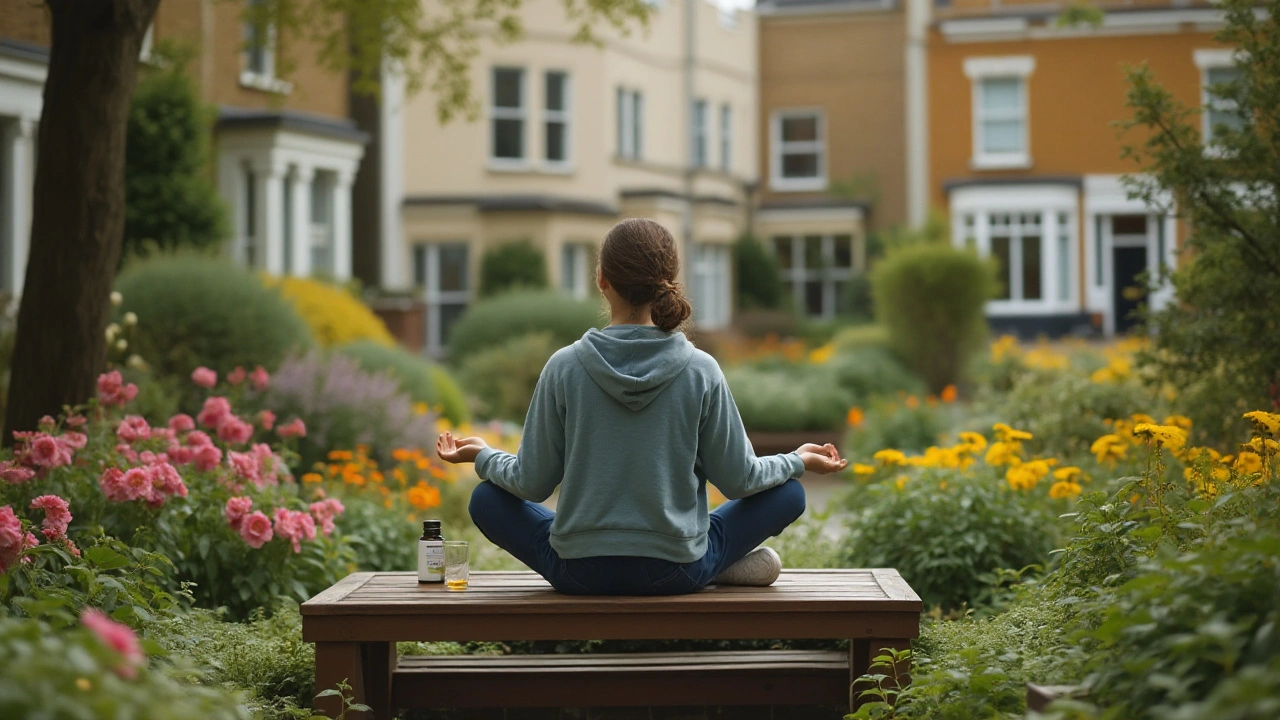In our fast-paced lives, stress seems to be an unavoidable companion. But did you know that melatonin, a hormone naturally produced by our bodies, can be a key player in managing it? This hormone, primarily known for regulating sleep cycles, holds surprising benefits for stress relief too.
Melatonin production is influenced by the day-night cycle. As night falls, melatonin levels rise, helping us feel sleepy. But its role goes beyond sleep. Research suggests melatonin can modulate stress responses, offering a natural way to keep stress in check.
This article explores melatonin's functions, its impact on stress, practical usage tips, and a holistic approach to stress management. By understanding and leveraging melatonin, you can potentially improve your quality of life and reduce stress.
- Understanding Melatonin and Its Functions
- How Melatonin Affects Stress Levels
- Practical Tips for Using Melatonin
- Holistic Approach to Stress Management
Understanding Melatonin and Its Functions
Melatonin, often known as the sleep hormone, is produced by the pineal gland in the brain. Its production is intimately linked with the body's internal clock, or circadian rhythm. As daylight wanes and darkness sets in, melatonin levels in the bloodstream increase, signaling the body that it's time to wind down and prepare for sleep. This rise in melatonin levels typically occurs in the evening and peaks during the night.
A major function of melatonin is to regulate sleep-wake cycles. This hormone helps synchronize our sleep patterns with the natural day-night cycle, making it easier to fall asleep and stay asleep. Besides its primary role in controlling sleep, melatonin serves as an antioxidant, scavenging harmful free radicals in the body. This dual action contributes to our overall health, enhancing not only how well we sleep, but also how our bodies repair and rejuvenate during rest.
Melatonin levels can vary due to several factors, including age, sunlight exposure, and lifestyle choices. As we age, our bodies tend to produce less melatonin, which may explain why older adults often experience sleep difficulties. Modern lifestyles with excessive light exposure, especially blue light from screens, can disrupt natural melatonin production. By limiting screen time and ensuring exposure to natural light during the day, we can help maintain healthy melatonin levels.
Several studies suggest that melatonin's benefits extend beyond sleep regulation. According to research published in the Journal of Pineal Research, melatonin may play a role in buffering the body's stress response. By helping to balance cortisol levels, the hormone associated with stress, melatonin could help alleviate some of the physical and psychological effects associated with chronic stress.
"Melatonin not only regulates the sleep-wake cycle but also has significant antioxidative and anti-inflammatory properties," says Dr. Russel Reiter, a leading expert in melatonin research.
Another fascinating aspect of melatonin includes its potential impact on the immune system. During periods of sleep, when melatonin levels are at their peak, our immune system gets a much-needed boost. This might explain why we often feel better after a good night's sleep when we are ill. Adequate sleep, supported by healthy melatonin levels, can enhance the production of immune-boosting cytokines and reduce inflammation, thereby playing an essential role in our body's defense mechanisms.
Melatonin supplements have become a popular remedy for those struggling with sleep issues or experiencing jet lag. Available in various forms - pills, gummies, and even liquid drops - these supplements aim to mimic the body's natural hormone production. It's crucial to consult with a healthcare provider before introducing melatonin supplements, as they can interact with certain medications and may not be suitable for everyone.

How Melatonin Affects Stress Levels
When it comes to managing stress, melatonin operates in ways that might surprise you. This hormone, often associated with sleep, has a direct impact on our body's stress response. Produced by the pineal gland in the brain, melatonin levels rise and fall in sync with the light-dark cycle. Interestingly, this sync doesn't just manage sleep but also affects how our body handles stressful situations.
One clear connection between melatonin and stress is its ability to minimize cortisol levels. Cortisol, commonly known as the "stress hormone," is released by the adrenal glands when we are stressed. High cortisol levels over a long period can lead to several health issues, such as anxiety, chronic fatigue, and depression. Melatonin helps regulate cortisol secretion, and a balanced melatonin level means a balanced cortisol level, leading to a more relaxed body and mind.
Moreover, melatonin has antioxidative properties. Oxidative stress, caused by an imbalance of free radicals and antioxidants in the body, often leads to cellular damage. This can make us feel more stressed. By neutralizing free radicals, melatonin indirectly reduces stress. Its antioxidative action can improve both mental and physical health, offering a natural barrier against stress.
Research also shows that melatonin may bolster immune function. Chronic stress is known to impair the immune system, making us more prone to infections and illnesses. Melatonin, by reducing stress, contributes to a stronger immune system. A study published by the National Library of Medicine highlights that melatonin's immunomodulatory effect helps in maintaining a robust immune response, further emphasizing its importance.
Another fascinating aspect is how melatonin influences the brain's neurotransmitters. These chemical messengers play a crucial role in mood regulation. By helping to maintain a stable balance of neurotransmitters like serotonin, melatonin can positively impact our emotional state, reducing feelings of stress and anxiety. This chemical interplay showcases the hormone's profound influence on emotional well-being.
Dr. Michael Breus, a clinical psychologist and sleep expert, once noted, "Melatonin isn't just about sleep; it's also about giving our bodies a chance to recover from the effects of stress. Proper melatonin levels can create a cascading effect of positive health outcomes."
Lastly, incorporating melatonin-rich foods in your diet can be an additional method to boost your melatonin levels naturally. Foods like cherries, nuts, and seeds contain this hormone and can contribute to stress relief. This, combined with a regular sleep schedule, can provide a robust defense against the pressures of daily life. Understanding melatonin's broader role can empower us to use it wisely in our quest for better stress management.

Practical Tips for Using Melatonin
Using melatonin effectively can make a huge difference in your quest for better sleep and lower stress levels. It's not just about popping a pill before bed; there's a bit more to consider. First off, it's crucial to understand the right dosage. Many find that doses between 0.5 mg and 3 mg work best. Higher doses don't necessarily improve sleep and can sometimes have the opposite effect. Melatonin doesn't require a hefty dose to be effective. Start small and see how your body responds.
Timing is everything when it comes to melatonin. Taking it 30 minutes to an hour before you plan to sleep can significantly improve its effectiveness. This allows the hormone to work naturally with your circadian rhythm. Avoid taking melatonin in the middle of the night as it can disrupt your sleep cycle.
Quality matters as well. Not all melatonin supplements are created equal. Look for products that are tested for purity and potency. Natural brands are often recommended, particularly those that do not contain artificial fillers or unnecessary additives. An easy way to ensure quality is by checking for third-party testing seals.
Combining melatonin with good sleep hygiene practices can enhance its benefits. Try to establish a regular sleep schedule where you go to bed and wake up at the same time every day. Create a relaxing bedtime routine that helps signal your body it's time to wind down. This could include activities like reading a book, listening to calming music, or even indulging in a warm bath.
Dr. Michael Breus, a clinical psychologist and renowned sleep expert, advises, 'Melatonin isn't a sleeping pill per se, but a way to facilitate the process' and tipping point for your natural sleep cycle.'
While taking melatonin, minimize exposure to screens at least an hour before bed. Electronic devices emit blue light, which can interfere with melatonin production. Consider using blue light filters if you must use your phone or computer in the evening.
You should also be aware of potential interactions. Melatonin can interact with certain medications, including blood pressure medication and immune suppressants. Consulting with a healthcare provider before starting melatonin supplements, especially if you're on medication, is always a good idea.
Another tip is to think of melatonin as part of a broader stress-management plan. Incorporate other stress-reducing activities like exercise, meditation, and maintaining a balanced diet. These practices can help make melatonin more effective and provide a more comprehensive approach to managing stress and improving sleep.
Finally, it's also important to note that melatonin is not a long-term solution. It can be a helpful tool for resetting your sleep schedule or managing stress during particularly tough periods, but it's not designed for permanent use. Long-term reliance can potentially reduce your body's natural production of the hormone.

Holistic Approach to Stress Management
Managing stress involves more than just popping a pill or taking a supplement. It requires a well-rounded approach that addresses both the mind and body. By integrating melatonin effectively into your lifestyle and combining it with other stress management techniques, you can achieve a more balanced and harmonious state of being.
First, it’s important to recognize the powerful role of melatonin as a natural remedy. This hormone not only improves sleep quality but also helps regulate mood and immune functions. To maximize its benefits, you can incorporate meditation or yoga into your daily routine. Both of these practices have been shown to reduce cortisol levels—the primary stress hormone—and enhance melatonin levels.
Diet also plays a vital part in managing stress holistically. Consuming foods rich in tryptophan like turkey, eggs, and nuts can naturally boost melatonin production. Additionally, reducing caffeine and sugar intake helps stabilize mood and energy levels, making you more resilient to stress. A balanced diet nourishes your body and supports overall well-being.
Exercise and Outdoor Activities
Physical activity is another cornerstone of stress management. Engaging in regular exercise, whether it be a daily walk or an intense workout, helps release endorphins. These feel-good hormones elevate your mood and counteract stress. Exercising outdoors can be particularly beneficial, as sunlight contributes to a healthy sleep-wake cycle and boosts melatonin production.
“Regular physical exercise has been confirmed as a significant factor in releasing stress and improving mental health,” says Dr. Rebecca Smith, a well-known wellness expert.
Community and social connections should not be overlooked when addressing stress. Building a strong support network can provide emotional stability and a sense of belonging. Engaging in social activities and maintaining healthy relationships keep the feelings of loneliness at bay, which is often a significant stress trigger.
Mindfulness and Relaxation Techniques
Mindfulness practices, such as progressive muscle relaxation and guided imagery, can also help manage stress levels. These techniques encourage you to focus on the present moment and disengage from the anxious thoughts plaguing your mind. Learning to manage your thoughts can be as crucial as any supplement in your stress management toolkit.
Integrating a consistent bedtime routine is another way to enhance the effects of melatonin. Turning off electronic devices at least an hour before bed, engaging in relaxing activities like reading or taking a warm bath, and ensuring your sleeping environment is dark and cool can significantly improve sleep quality.
Here is a summary of steps you can follow for a holistic approach to stress management:
- Incorporate melatonin-rich foods and supplements.
- Engage in regular physical activity, preferably outdoors.
- Practice mindfulness and relaxation techniques.
- Maintain strong social connections.
- Establish a consistent bedtime routine.
By adopting these holistic practices, integrating melatonin into your routine, and making lifestyle changes, you can manage stress more effectively. These strategies can collectively contribute to a better quality of life.


Mike Gordon
September 11, 2024 AT 15:50Melatonin isn't magic, but it's way better than popping benzodiazepines every night. I've been taking 1mg for a year now, just to reset my clock after late shifts. No grogginess, no dependency. Just quiet, deep sleep. My anxiety dropped too. Not sure if it's the melatonin or just sleeping better, but I'm not complaining.
Kathy Pilkinton
September 12, 2024 AT 22:38Oh great. Another 'natural remedy' post. So now we're selling hormones like herbal tea? My grandma didn't need melatonin to raise three kids and work two jobs. You people are so weak. Just go to bed earlier. Or don't. I'm sure your phone will still glow at 2am. 💀
Holly Dorger
September 14, 2024 AT 12:00Im not a doctor but i read a lot and i think melatonin helps more than people think. I started taking it after my dad passed and i couldnt sleep for months. it wasnt a cure but it gave me back like 2 hours of real sleep a night. that was enough to not cry at work. just saying. its not just for jet lag.
Amanda Nicolson
September 15, 2024 AT 07:25Okay but imagine this: your body is this tiny, overworked factory that’s been running 24/7 since 2019, and melatonin is the quiet intern who finally shows up at midnight with a cup of chamomile tea and shuts down the lights. No fanfare. No applause. Just... stillness. And for the first time in years, your brain remembers how to rest. That’s not a supplement. That’s a love letter from your own biology. I cried the first time I slept through the night without counting ceiling cracks. It felt like coming home.
Jackson Olsen
September 15, 2024 AT 09:25i tried melatonin once. took 5mg. woke up at 3am feeling like a zombie. now i just turn off my phone and read a book. works better. also, sunlight in the morning helps. its simple. no pills needed.
Penny Clark
September 15, 2024 AT 20:52melatonin changed my life. i used to be up till 4am scrolling and then exhausted all day. now i take 0.5mg at 10:30 and by 11 i’m out. no more racing thoughts. i even started meditating after. its like my brain finally got a break. i dont know why more people dont talk about this. its not a drug, its just… your body’s own night shift manager. 🌙
Niki Tiki
September 16, 2024 AT 11:58Why do Americans need a pill to sleep? We used to just go to bed when it got dark. Now we got screens and supplements and therapy and yoga and all this crap. My grandpa worked 12 hours a day in a factory and slept like a log. He didn't need no hormone. Just a hard day and a cold floor. We got soft.
Jim Allen
September 17, 2024 AT 13:40melatonin is just the universe's way of saying 'you've been awake too long, buddy' 🤓. we're not designed to glow in the dark. we're designed to hibernate in the dark. the real problem isn't stress-it's that we've turned night into day and wonder why we're all falling apart. also, i'm not a fan of pills. just go outside. touch grass. the sun will fix you. or not. i'm just a guy on the internet.
Nate Girard
September 18, 2024 AT 00:59For real-melatonin is the quiet MVP of mental health. I started using it after burnout, not to sleep, but to feel human again. And yeah, it’s not a cure-all, but paired with walks, no screens after 9, and talking to my therapist? It’s the missing piece. You don’t need to be a sleep guru. Just try it for a week. Your nervous system will thank you. You’re not broken. You’re just tired. And that’s okay.
Carolyn Kiger
September 19, 2024 AT 22:21I’ve been using melatonin for 8 months now. Started with 0.5mg. Now I take it only when I’m traveling or after a really rough week. It’s not a daily crutch-it’s a bridge. And I love that it’s natural. I also eat tart cherries before bed now. They taste like little red nightcaps. 🍒 And honestly? I sleep like a baby. No nightmares. No tossing. Just deep, quiet rest. Thank you for writing this. It’s nice to see science backing what feels true.